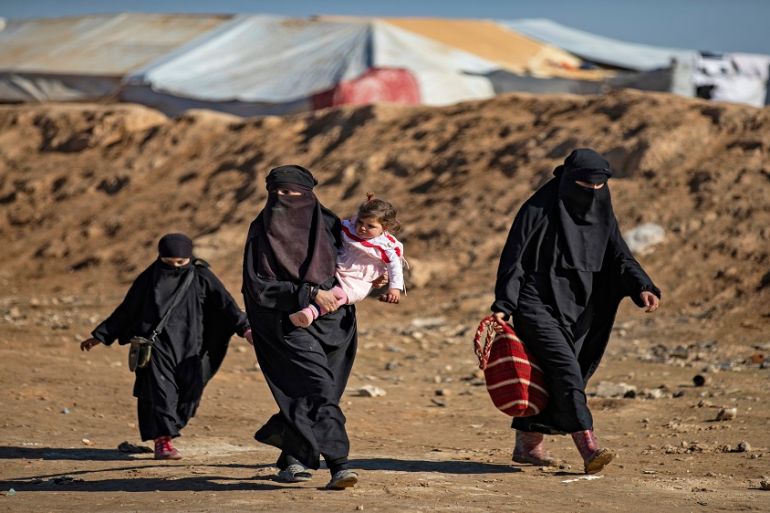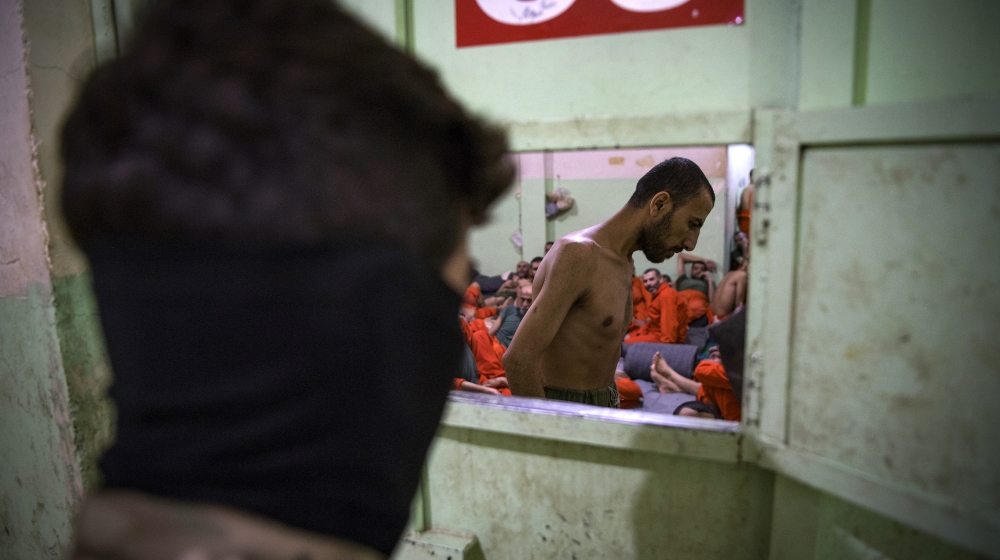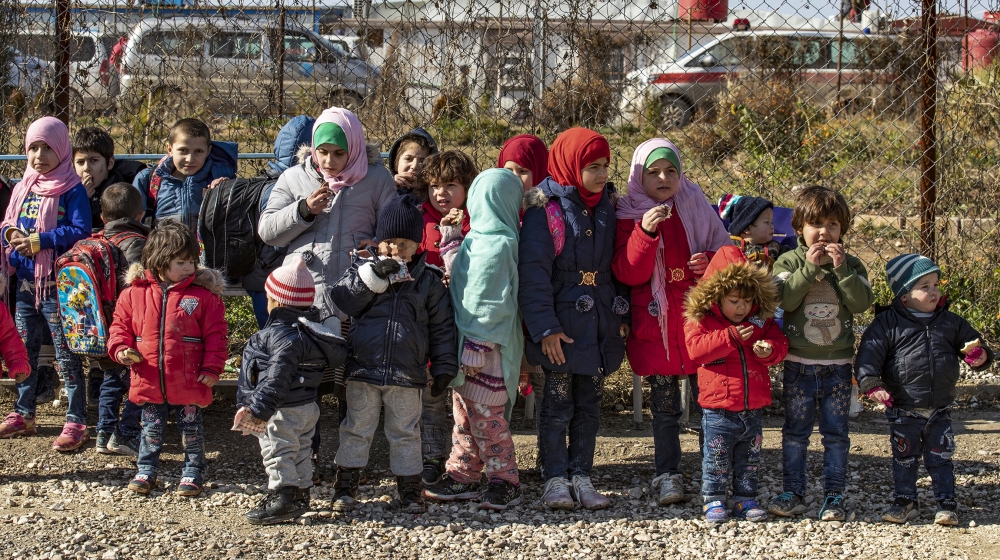Let ISIL-linked Canadians in Syria come home: Rights group
Human Rights Watch report says Canadians being arbitrarily detained in ‘filthy and inhuman’ conditions.

A rights group has called on Canada to repatriate 47 of its citizens, including 26 children “unlawfully detained in dire conditions” in northeast Syria, accused of having links to ISIL (ISIS).
On Monday, Human Rights Watch (HRW) released a report documenting the situation the detainees were in and calling on Canada to urgently bring its citizens home, giving priority to children and other vulnerable detainees.
Keep reading
list of 4 itemsThe Lost Souls of Syria – Part 1
Is the US shipping weapons to Israel tacit support for its war on Gaza?
Nakba remembered: What is the right of return?
Since 2017, the Kurdish-led authorities in northeast Syria have repeatedly urged countries to repatriate their nationals, saying they lack the capacity to properly guard them. On 22 June, France repatriated 10 children from northeast Syria.
“The Canadian government has decided it is not convenient to discuss the issue politically,” Sara Kayyali, Syria researcher at HRW, told Al Jazeera.
“Canada has failed to provide moral authority on the issue of repatriation in Syria,” she said.
Canada’s foreign ministry, Global Affairs Canada, informed Al Jazeera in an email: “Given the security situation on the ground and the current COVID-19 context, the Government of Canada’s ability to provide any kind of consular assistance in Syria remains extremely limited.
“The security environment in northeastern Syria is unstable and highly complex. Intermittent combat operations between various armed actors and an ongoing terrorist threat from several violent extremist organizations are among the specific threats that could impact any government activities in this region.”

‘Filthy and inhuman’
The report, Bring Me Back to Canada: Plight of Canadians Held in Northeast Syria for Alleged ISIS Links, said Canadians have been arbitrarily detained with other foreigners in “filthy and often inhuman and life-threatening conditions” by authorities in northeast Syria. It charges that the prisons in which men and boys are kept are severely overcrowded and medical care is “grossly inadequate”.
Women and children are kept in al-Holand Roj in heavily guarded open-air camps in al-Hasakah governorate. Intermittent water shortages could encourage the spread of COVID-19, HRW said.
|
|
During visits to al-Hol camp in June 2019, HRW found women and children living in tents that collapsed in strong winds or had flooded with rain or sewage. HRW researchers saw worms in water that children were drinking. Latrines were overflowing and garbage littered the grounds of the camps. Medical care and basic provisions such as diapers and sanitary towels were insufficient, the report said.
No charges
Like other foreigner detainees in northeast Syria, the detained Canadians have not been charged with any crime.
“The Kurdish-led authorities want the detainees to be prosecuted in their own countries. The authorities are only holding them as an interim measure,” Farida Deif, Canada director of HRW, told Al Jazeera. She said the northeast Syrian authorities have failed to bring the Canadians before a local judge to review the legality and necessity of their detention, and that until Canada acts, they could be detained indefinitely.
Canadian Foreign Affairs Minister Francois-Philippe Champagne told HRW that Canada’s efforts help the detainees were hampered by not having a consulate in Syria, and because northeast Syria is too dangerous for government officials to enter.
Canada has, however, repatriated 29 of its citizens from Syria between March and May 2020. And at least 20 other countries – including Canadian allies such as Australia, Germany, France, the United Kingdom and the United States – have repatriated their nationals suspected of having ISIL ties from camps and prisons in northeast Syria.

‘Left without a family’
Most of the 26 Canadian children are younger than six including a five-year-old orphan, Amira, whose parents and three siblings were killed in an air raid. Amira is currently being held in a children’s centre.
“Bring Me Back to Canada”
Plight of Canadians Held in Northeast Syria for Alleged ISIS Links – New @HRW report: https://t.co/OgS011T4dq pic.twitter.com/le1hMNwdoE— Human Rights Watch (@hrw) June 29, 2020
Sixteen independent human rights experts at the United Nations have called on Canada to repatriate Amira and have described the repatriation of children as “a humanitarian and human rights imperative”. No progress has been made in Amira’s case.
According to HRW, children who lived under ISIL and any women trafficked by the armed group should be treated first and foremost as victims.
Under the UN Convention on the Rights of the Child (CRC), countries have a responsibility to ensure that children are not deprived of the right to a nationality. Canada ratified the CRC in 1991.
“In terms of article 20 of the CRC, she [Amira] has a right to special protection and assistance by the state,” Ruth Brittle, child rights expert and lecturer at Nottingham Trent University, told Al Jazeera. “There is an obligation to provide alternative care, such as foster care, kafala or adoption, if it is in the child’s best interests. But the child should not be left without a family.”
Brittle added: “If other states have been able to secure release of citizens from the same detention facilities, then the obligation on international cooperation to improve the living conditions and ensure the rights of these children applies. By doing nothing, Canada is complicit in the arbitrary/unlawful detention of these children and the other violations of the children’s rights.”
The HRW report found that the Canadian government may be unlawfully withholding effective consular assistance to the group of 47 citizens, which is a violation of international law. Under international law, it is prohibited to withhold consular services in a discriminatory manner because of factors such as people’s religion or their political or other views.
Collective punishment
Canada has an obligation to repatriate its citizens pursuant to UN Security Council resolution 1326, according to Sarah Kay, a human rights lawyer specialising in counterterrorism. The repatriations that have taken place by various European and other countries have been inadequate, Kay said, and foreigners held in Syria are experiencing “every conceivable single human rights violation”.
The report states that the indefinite detention without charge of the Canadians amounts to guilt by association and collective punishment, which are prohibited under international law.;
HRW recommends that Canada increase communication with the detainees as well as their relatives in Canada or abroad, verify citizenship, issue citizens travel documents, and provide safe passage to Canadian consulates or territory.
It is further recommended that upon the detainees’ return, they should be offered rehabilitation and reintegration services. If appropriate, those suspected of serious crimes should be investigated and prosecuted according to international fair trial standards, the report says.
HRW recommends that the Canadian government investigate all allegations of torture and inhuman treatment of Canadians detained in northeast Syria.